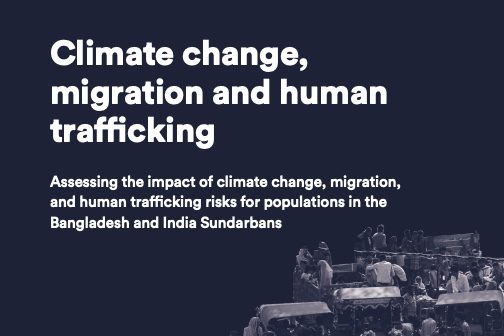
Report: Climate change, migration and human trafficking
Abstract
The Sundarbans region of Bangladesh and India face several climatic risk factors, and for communities in the area they can be compounded by social, economic, and political struggles. Primary data on the ‘human trafficking-environmental degradation-climate change nexus’ for decision-making has been lacking with an emphasis on the use of proxy data. Being able to fill gaps with evidence from the communities being directly affected by such issues is important to be able to develop support mechanisms that are situation-specific, useful, and easy to access, and which reduce the vulnerabilities of communities and thus their risk of exploitation.
In this report, we outline a three-pronged research project funded by CAFOD in partnership with Caritas Bangladesh, Caritas India and OKUP (all in-country), with research being led by researchers at the Rights Lab (University of Nottingham). First, a review of the current academic and grey literature on topics related to migration, human trafficking and climate change was undertaken. This was followed by a series of in-country stakeholder interviews to gather evidence from organisations and officials to compare against household survey data with communities across the Sundarbans in both India and Bangladesh. Findings indicated that there was a link between climate change factors and the choices households made with regards to livelihoods and migratory practices. Issues of debt bondage, human trafficking and forced marriage were identified, and contrasting viewpoints between stakeholders within the regions, and those who are on the forefront of such impacts were notable.
The research presented took place between May and November 2022 with the aim of feeding into a series of intervention programmes run by Caritas India, Caritas Bangladesh and OKUP – funded by CAFOD – following the conclusion of the research project until December 2023.
